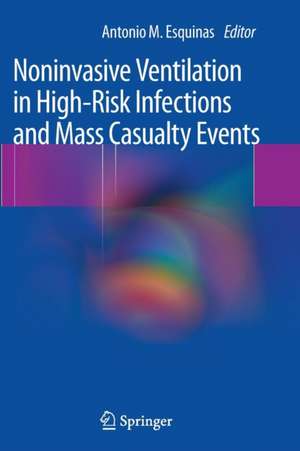Noninvasive Ventilation in High-Risk Infections and Mass Casualty Events
Editat de Antonio M. Esquinasen Limba Engleză Paperback – 23 aug 2016
Preț: 894.65 lei
Preț vechi: 1091.03 lei
-18% Nou
Puncte Express: 1342
Preț estimativ în valută:
171.25€ • 186.07$ • 143.94£
171.25€ • 186.07$ • 143.94£
Carte tipărită la comandă
Livrare economică 21 aprilie-05 mai
Preluare comenzi: 021 569.72.76
Specificații
ISBN-13: 9783709119709
ISBN-10: 3709119707
Pagini: 392
Ilustrații: XIX, 370 p. 30 illus., 20 illus. in color.
Dimensiuni: 155 x 235 x 21 mm
Greutate: 0.55 kg
Ediția:Softcover reprint of the original 1st ed. 2014
Editura: SPRINGER VIENNA
Colecția Springer
Locul publicării:Vienna, Austria
ISBN-10: 3709119707
Pagini: 392
Ilustrații: XIX, 370 p. 30 illus., 20 illus. in color.
Dimensiuni: 155 x 235 x 21 mm
Greutate: 0.55 kg
Ediția:Softcover reprint of the original 1st ed. 2014
Editura: SPRINGER VIENNA
Colecția Springer
Locul publicării:Vienna, Austria
Cuprins
Part I.- NIV and high-risk airborne infections.- Section 1.- History and epidemiology.- Section 2.- Physiopathology.- Section 3.- Ventilatory strategies during ARF in high-risk infections.- Section 4.- Noninvasive mechanical clinical experience.- Part II. NIV in mass casualty incidents.- Section 5.- Rationale of ARF treatments in mass casualties.- Section 6.- Mass casualties, biological etiology.- Section 7.- Biological mass casualties, biological etiology.- Section 8.- Hospital organizations guidelines. Clinical and health organizations perspectives.- Section 9.- Model health systems in ARF assistance.- Section 10.- Health organisations guidelines. Clinical and health organizations perspectives.- Section 11.- Future research.
Notă biografică
Antonio M. Esquinas, MD, PhD, is President of the International Association of Non-Invasive Mechanical Ventilation.
Textul de pe ultima copertă
The past few decades have seen major impacts of different pandemics and mass casualty events on health resource use in terms of rising healthcare costs and increased mortality. In this context, the development of acute respiratory failure in patients requires the use of mechanical ventilation, either invasive or noninvasive. Recently, noninvasive ventilation (NIV) has proved to be a valuable strategy to reduce mortality rates in patients. This is the first book to describe the clinical indications of NIV in patients who have been hospitalized with high-risk infections as well as in the prehospital management of mass casualty incidents, including chemical or biological disasters and pandemics. Compiled by internationally respected experts, it offers comprehensive coverage of all aspects of noninvasive mechanical ventilation in public health emergencies, such as equipment needs and guidelines for health organizations. Considering recent events (SARS, H1N1 influenza pandemic), the book concludes with a critical review of current studies and future prospects for the use of NIV, offering a valuable resource for all practitioners managing mass casualty incidents and disasters.
Caracteristici
First comprehensive book devoted to the topic of NIV in high-risk infections and mass casualty situations With contributions by international experts State-of-the-art contents ?
